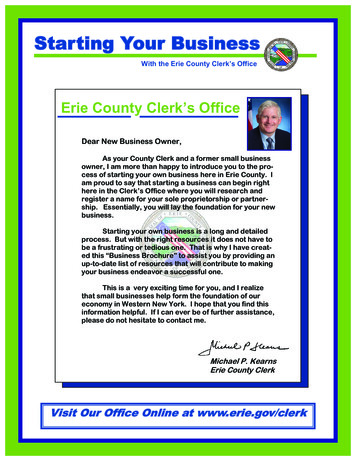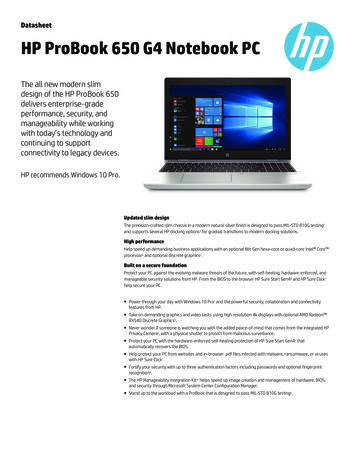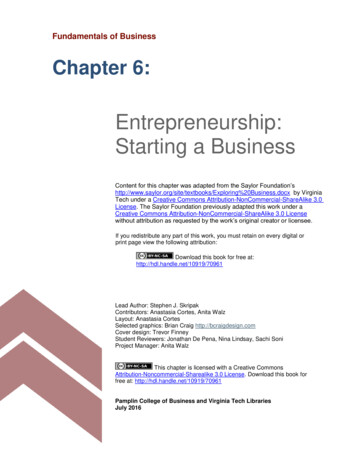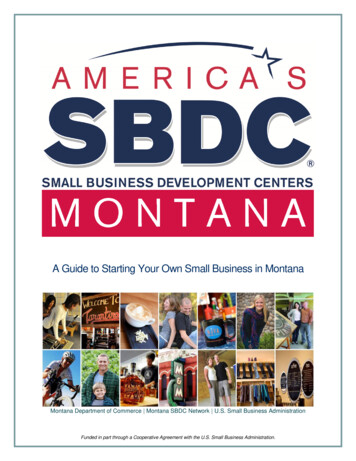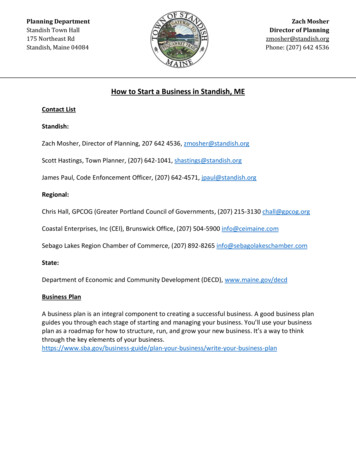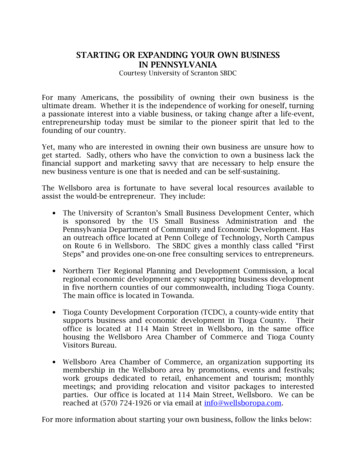
Transcription
STARTING OR EXPANDING YOUR OWN BUSINESSIN PENNSYLVANIACourtesy University of Scranton SBDCFor many Americans, the possibility of owning their own business is theultimate dream. Whether it is the independence of working for oneself, turninga passionate interest into a viable business, or taking change after a life-event,entrepreneurship today must be similar to the pioneer spirit that led to thefounding of our country.Yet, many who are interested in owning their own business are unsure how toget started. Sadly, others who have the conviction to own a business lack thefinancial support and marketing savvy that are necessary to help ensure thenew business venture is one that is needed and can be self-sustaining.The Wellsboro area is fortunate to have several local resources available toassist the would-be entrepreneur. They include: The University of Scranton’s Small Business Development Center, whichis sponsored by the US Small Business Administration and thePennsylvania Department of Community and Economic Development. Hasan outreach office located at Penn College of Technology, North Campuson Route 6 in Wellsboro. The SBDC gives a monthly class called “FirstSteps” and provides one-on-one free consulting services to entrepreneurs. Northern Tier Regional Planning and Development Commission, a localregional economic development agency supporting business developmentin five northern counties of our commonwealth, including Tioga County.The main office is located in Towanda. Tioga County Development Corporation (TCDC), a county-wide entity thatsupports business and economic development in Tioga County. Theiroffice is located at 114 Main Street in Wellsboro, in the same officehousing the Wellsboro Area Chamber of Commerce and Tioga CountyVisitors Bureau. Wellsboro Area Chamber of Commerce, an organization supporting itsmembership in the Wellsboro area by promotions, events and festivals;work groups dedicated to retail, enhancement and tourism; monthlymeetings; and providing relocation and visitor packages to interestedparties. Our office is located at 114 Main Street, Wellsboro. We can bereached at (570) 724-1926 or via email at info@wellsboropa.com.For more information about starting your own business, follow the links below:
To request assistance from Sue Dillon, Consultant, University of Scranton’sSmall Business Development Center, complete the “Request for Counseling”form. Ms. Dillon can assist you in the preparation of a business plan, sortingthrough regulatory requirements, and financing options.
THINGS TO CONSIDER BEFORE YOUSTART YOUR OWN BUSINESSCourtesy University of Scranton SBDCThe items below are the critical components of a Business Plan. Business Plansaccomplish several things: Objectively states the needs of the business such as start-up andoperating costs. Indicates where more planning and effort may be required. Provides potential lenders with a full picture of your proposedbusiness.Prepare a written document that covers the following points:1. Business Objectives – state in 50 words or less:a. The service or product you will sell,b. Who you will sell your service or product to, andc. What will make your business stand out from the competition?2. Personal Objectivesa. Why are you starting this business?b. What are your income requirements?3. What is the proposed business location?4. What will be your hours of operation?5. Who is the competition?6. What is your marketing strategy?7. What materials and inventory are needed, and who will be the suppliers?8. Identify the regulatory requirements – for example:a. Form of organization (e.g., sole proprietorship, corporation)b. What permits and licenses are required?c. Federal Employer Identification Number (EIN)d. Pennsylvania Sales Tax Numbere. Zoning and building codes9. What is the business’s “break-even” point? Determine the following:a. Monthly operating expenses
Rent, payroll, taxes, utilities, advertising, insurance, travel,supplies, equipment, postage, telephone, trash removal,licenses, maintenance, accounting fees, legal feesb. Cost of goods; the cost to purchase or manufacture what you aresellingc. Volume of sales needed to meet the above costs10.What is your start-up cost? Do you need financing?11.What insurance coverage is needed; e.g., liability, workers compensation,fire, theft, life, health, auto?12.What recordkeeping system(s) will you use for income, expenses,customer records, payroll, inventory and purchasing?13.What accounting or legal services are needed?
FREQUENTLY ASKED QUESTIONSQA–How do I get information about my fic.aspQA-How do I locate potential suppliers for my business?Harris Directory – www.harrisinfo.comThomas Register – www.thomasregister.comQA-How do I get involved in a franchise?“Franchise Opportunities Handbook”January 2006 issue of Entrepreneur magazineQA-How do I get demographic information?U.S. Census Bureau – www.census.govPA Small Business Development Center – www.pasbdc.orgNorthern Tier Regional Planning and Development Commission 20Profile.pdf
STARTING A BUSINESS – BEGINNING STEPSCourtesy University of Scranton SBDCFirst steps to take when starting your business, as well as important resources.1. Register the Name. Any company conducing business in Pennsylvaniaunder as assumed or fictitious name must register the name with thePennsylvania Department of State.a. File Form DSCB:54-311 with the Corporations Bureau. The currentcost to register is 70 for individuals and corporations.Fictitious Name SearchCorporations BureauPO Box 8722Harrisburg, PA 17105-8722(717) 787-1057 or (717) 787-2004www.dos.state.pa.us/corpsb. Place an advertisement in one local newspaper with generalcirculation and the county legal paper.For Tioga County,Pennsylvania:Wellsboro Gazette25 East AvenueWellsboro, PA 16901(570) 724-22872. Apply for an Employer Identification Number (EIN).a. Submit Form SS-4, available from SBDC, or from the IRS at .irs.gov/pub/irs-pdf/fss4.pdf3. File an Enterprise Registration Form. The Pennsylvania Departments ofRevenue and Labor & Industry have developed a combined enterpriseregistration form, PA100. The form is used to register a business for anyof the following:Cigarette LicenseEmployer WithholdingLiquid Fuels & Fuels TaxMotor Carriers Road TaxPublic Transportation Assistance TaxSales TaxTransient VendorCorporation TaxesHotel Occupancy TaxLocal Sales TaxPromoterReporting & Payment MethodsSales Tax Exempt StatusUnemployment Compensation
Use Taxa. usVehicle Rental TaxfromSBDC,orb. The application must be filed prior to commencing business. Ifyou are unsure whether you will need to collect sales tax, call (717)787-1064.4. Comply with Local Regulations. Business licenses may be required bythe local municipal government. Contact the borough or township whereyour business will be located to obtain the rules and regulations,including business licenses, zoning requirements, occupational privilegestaxes and local income tax rules. Charleston Township (570) 724-5353Chatham Township (570) 376-5521Covington Township (570) 659-5439Deerfield Township (814) 326-4308Delmar Township (570) 724-5482Duncan Township (570) 353-7532Farmington Township (570) 827-2584 or (570) 827-3016Gaines Township (814) 435-6471Hamilton Township (570) 638-3592Jackson Township (570) 537-6367Lawrence Township (570) 827-2254 or (570) 827-2784Lawrenceville Borough (570) 827-2066Liberty Township (570) 324-3621Mansfield Borough (570) 662-2315Middlebury Township (570) 376-2232Morris Township (570) 353-2270Nelson Township (570) 827-7892Osceola Township (814) 258-5411Putnam Township (570) 659-9595Richmond Township (570) 662-3774Roseville Borough (570) 549-5755Rutland Township (570) 549-4503Shippen Township (570) 724-1790Sullivan Township (570) 549-7051Tioga Borough (570) 835-5226Tioga Township (570) 835-5130Union Township (570) 673-3395Ward Township (570) 673-3704Wellsboro Borough (570) 724-3186Westfield Borough (814) 367-2632Westfield Township (814) 367-2997
5. Obtain the Necessary Occupational License. The following are availableLicense types by profession. Licensure requirement can be found on theDepartment of State’s website, http://www.dos.state.pa.us/bpoa/site Accountancy – Accountancy Firm, Certified Public Accountant,Public AccountantArchitects – Registered Architect, Architectural FirmAuctioneer – Apprentice Auctioneer, Licensed Auction House,Auctioneer, Licensed Auction Company, Registered AuctionCompany, Registered Auction HouseBarber – Barber Teacher, Barber Manager, Barber, Barber Shop,Barber SchoolCertified Real Estate Appraiser – Certified Residential Appraiser,Certified General Appraiser, Certified Pennsylvania Evaluator,Certified Broker/AppraiserChiropractor – ChiropractorCosmetology – Cosmetology Teacher, Cosmetologist, Cosmetician,Manicurist, Cosmetologist Shop, Cosmetician Shop, ManicuristsShop, Cosmetology SchoolDentistry – Dentist, Dental Hygienist, Anesthesia PermitUnrestricted, Anesthesia Permit Restricted I, Anesthesia PermitRestricted IIEngineer – Professional Engineer, Professional Land Surveyor,Professional GeologistFuneral Director – Funeral Director, Funeral Supervisor, FuneralDirector Limited, Branch, Estate, Professional Corporation, SoleProprietor, Partnership, Restricted Business Corporation, Widow,Pre-1935 Business CorporationLandscape Architect – Landscape ArchitectMedicine – Medical Physician and Surgeon, Graduate MedicalTrainee, Medical Interim Limited, Drugless Therapist, MedicalPhysician Assistant, Acupuncturist, Midwife, Respiratory CarePractitioner, Athletic TrainerNavigation Commission – Pilot First Class, Pilot Second Class, PilotThird Class, Pilot Fourth Class, Pilot Fifth Class, Pilot Sixth ClassNursing – Registered Nurse, Practical Nurse, Certified RegisteredNurse Practitioner, Dietician-NutritionistNursing Home Administration – Nursing Home AdministratorOccupational Therapy – Occupational Therapist, OccupationalTherapist Assistant, Occupational eLocation,Optometrist Diagnostics, Optometrist Therapeutics, OptometristTherapeutics/GlaucomaOsteopathic Medicine – Osteopathic Physician and Surgeon,Osteopathic Physician Assistant, Osteopathic Acupuncturist,Osteopathic Respiratory Care, Osteopathic Physician, GraduateOsteopathic Trainee, Athletic Trainer
Pharmacy – Pharmacist, Pharmacy Retail, Pharmacy InstitutionPhysical Therapy – Physical Therapist, Physical Therapy AssistantPodiatry – Doctor of Podiatric MedicinePsychology – PsychologistReal Estate Commission – Associate Broker, Cemetery AssociateBroker, Cemetery Registration, Cemetery Broker (Sole Proprietor),Cemetery Broker of Record, Cemetery Salesperson, Manager ofRecord, Branch Office, Broker (Sole Proprietor), Broker (Corp, LLC,Partner), Rental Listing Referral Agent, Real Estate Salesperson,Real Estate School, Broker Multi-Licensee, Cemetery Broker (Corp,LLC, Partner), Rental Listing Referral Agent, CampgroundMembership Salesperson, Builder/Owner Salesperson, Time ShareSalespersonSocial Work – Social Worker, Clinical Social Worker, Marriage andFamily Therapist, Professional CounselorSpeech & Hearing – Speech Language Pathologist, Audiologist,Teacher of the Hearing ImpairedVehicle Board – Vehicle Dealer, Vehicle Salesperson, Vehicle Branch,Vehicle Auction, Vehicle Manufacturer, Manufacturer Branch,Vehicle Registration, Vehicle Distributor, Used LotVeterinary Medicine – Veterinarian, Veterinary Technician6. Other Resources for Licenses and Taxes in Pennsylvania.Liquor & Beer License – Liquor Control Board(717) 783-8250, www.lcb.state.pa.usDrug, Devices & Cosmetics License – State Department of Health(717) 787-2307, www.health.state.pa.usEating & Drinking Permit – PA Department of Agriculture(717) 787-4737, www.agriculture.state.pa.usManufacture of Frozen Desserts – PA Department of AgricultureForm AFC-222(717) 772-8573, www.agriculture.state.pa.usBedding & Upholstery Registration – Department of Labor & IndustryForm LIBU 32A and Form LIBU 28(717) 787-6848, www.dli.state.pa.usStuffed Toy Registration – Department of Labor & IndustryForm LIBU 35 and Form LIBU 47(717) 787-6848, www.dli.state.pa.usEmployment Agency License – Department of Labor(717) 783-1697, www.dli.state.pa.us
Adult Day Care License – Department of Public Welfare(570) 963-4749, www.dpw.state.pa.usChildren’s Day Care Center – Department of Public Welfare(570) 963-4371, www.dpw.state.pa.us
ADDITIONAL REGULATORY AND ENVIRONMENTREQUIREMENTSCourtesy University of Scranton SBDCDid you know that some regulatory and environmental requirements apply toall businesses, regardless of size or type? For example: All businesses must display an OSHA workplace safety poster in theworkplace.All businesses with one or more employees must have a written HazardCommunication Program, if they are using hazardous chemicals in theworkplace.All businesses, then those with less than ten employees, mustcommunicate an Emergency Action Plan and a Fire Prevention Plan totheir employees.All businesses must comply with Pennsylvania Department of Labor &Industry mandatory workplace postings.All businesses with more than ten employees must post a summary ofoccupational illnesses and injuries (from February 1 through April 30)and submit annual illness and injury reports to OSHA.All businesses using standard fluorescent light bulbs (containingmercury) should either recycle or switch to low mercury lamps – simplythrowing your old lands in the dumpster is not permitted.All businesses that generate greater than 220 pounds of hazardous wasteper month must obtain an EPA Identification Number.All businesses wishing to operate a new or existing regulated storagetank must register that tank with the Department of EnvironmentalProtection.Small businesses can reduce their workers’ compensation premiums by5% each year for up to five years if they establish a safety commitmentthat meets certain requirements.The following small businesses may need environmental permits and/orare subject to environmental regulations:o Auto repair shopso Auto body shopso Bakerieso Car washeso Dry cleanerso Farmso Gasoline service stationso House architectural structure painterso Laundromatso Print shopso Refrigeration/air conditioning serviceo Restaurants
To learn more about these and other potential environmental, health andsafety regulatory requirements for your small business, contact:PASBDC Environmental Management Assistance Program (EMAP)(877) 275-3627www.askemap.orgOr contact Sue Dillon, Consultant, University of Scranton SBDC, (570) 7247703
HOW TO FORM YOUR LEGAL BUSINESS STRUCTURECourtesy University of Scranton SBDCOnce you decide to establish a business, your first consideration will be thetype of organization to use. Legal and tax considerations will help determineyour final choice, as well as personal needs of the particular business. Thereare three principal kinds of business structures: the sole proprietorship, thepartnership, and the corporation.There are advantages and disadvantages to each of the legal forms of businessyou may choose. As an entrepreneur, you must examine all the characteristicsand consult a knowledgeable legal professional when considering the formationof your business.SOLE PROPRIETORSHIPMost small businesses operate as sole proprietorships. This is the simplestform of organization and allows the single owner to have sole control andresponsibility. Some advantages of the sole proprietorship are less paperwork,a minimum of legal restrictions, owner retention of all profits, and ease indiscounting the business. Disadvantages include unlimited personal liability ofall debts and liabilities of the business, limited ability to raise capital, andtermination of the business upon the owner’s death.You should note that a small business owner might select the soleproprietorship to begin. Later, if the owner succeeds and feels the need, he orshe may decide to form a partnership or corporation.GENERAL PARTNERSHIPA partnership is similar to a sole proprietorship except that two or more peopleare involved. Advantages are that it is easy to establish, can draw on thefinancial and managerial savvy of all of the partners, and the profits are notdirectly taxes. Some disadvantages are unlimited personal liability for thefirm’s debts and liabilities, termination of the business with the death of apartner, and the fact that any one of the partners can commit the firm toobligations.Te partnership is formed by an agreement entered into by each partner. Thisagreement may be informal, but it is advisable to have a written agreementdrawn up between all parties. While no filing is required to form a generalpartnership, it may be required to file a fictitious name registration. Refer tothe section “How to Register Your Business Name.”
LIMITED PARTNERSHIPA limited partnership is a partnership formed by two or more people, havingone or more general partners and one or more limited partners. The limitedpartners have limited exposure to liability and are not involved in the day-today operations of the limited partnership.A Pennsylvania limited partnership is formed by filing with the CorporationBureau, Department of State: Certificate of Limited Partnership, Form DSCB:15-8511, and Docking Statement in duplicate, Form DSCB:15-134A.LIMITED LIABILITY COMPANYThe limited liability company (LLC) is a hybrid between a partnership and acorporation, providing the liability protection of a corporation with theadvantage of being treated as a partnership. This allows flexibility of apartnership with the liability protection of a corporation.A Pennsylvania limited liability company is formed by filing with theCorporation Bureau, Department of State: Certificate of Organization, Form DSCB:15-8913, and Docking Statement in duplicate, Form DSCB:15-134A.LIMITED LIABILITY PARTNERSHIPA limited liability partnership (LLP) is an existing partnership that files anelection with the Corporation Bureau, Department of State, claiming LLP status.The effect of becoming an LLP is to provide general partners with additionalprotection from liability.A Pennsylvania limited liability partnership is formed by filing with theCorporation Bureau, Department of State: Election of LLP Status, Form DSCB:15-8201A, and Docking Statement in duplicate, Form DSCB:15-134A.CORPORATIONA corporation is the most complex form of business organization. It is costlierand more difficult to create because of the paperwork required. Businessactivities are restricted to those listed in the corporate charter. However, mostcorporations list a general-purpose clause.Advantages of a corporation are that the liability is limited to the amountowners have paid into their share of stock, and the corporation’s continuity is
unaffected by the death or transfer of shares by any of the owners. Somedisadvantages are extensive recordkeeping, close registration, and doubletaxation (taxes paid on profits and taxes paid on dividends paid to owners).A Pennsylvania corporation is formed by filing with the Corporation Bureau,Department of State: Articles of Incorporation, Form DSCB:15-1306 and Docking Statement in duplicate, Form DSCB:15-134A,Foreign (out of state) corporations must submit an application for a Certificateof Authority (form DSCB:15-4124) to conduct business in Pennsylvania.S CORPORATIONClosely held corporations may elect to be taxed as federal or state scorporations (IRC 1361-1379), which permit shareholders to pay taxes oncorporate net income personally, as if it were a partnership. S corporationstatus is limited to corporations that have a certain limited number ofshareholders. The percentage of income the corporation can derive frompassive investments is also restricted. A Pennsylvania corporation cannot electto be an S corporation unless it has also applied for federal S status.A Pennsylvania S corporation is formed by filing with the PennsylvaniaDepartment of Revenue within 75 days of the beginning of your fiscal year: Form REV-1640When you receive a copy of your federal notification of approval from the IRS,you must provide a copy to the Pennsylvania Department of Revenue. Scorporations are responsible for filing and paying Capitol Stock Tax.CONTACT INFORMATIONBureau of Corporation TaxesPennsylvania Department of RevenueSpecialty Taxes DivisionAttn: “S” CorporationHarrisburg, PA 17128-0704(717) lt.aspCorporation BureauPennsylvania Department of State206 North Office BuildingHarrisburg, PA 17120(717) 787-1057 or (888) 659-9962www.dos.state.pa.us/corps/site/default.asp
OBTAINING MONEY FOR STARTING UP, EXPANDING ORPURCHASING A SMALL BUSINESSCourtesy Sue Dillon, Consultant, University of Scranton SBDCUnfortunately, television hucksters who market their books for sale give theimpression that there is easy money to be had for starting a business. This isnot the case. However, small businesses do have several options with regard tofinancing.HOW BUSINESSES ARE COMMONLY FINANCED1. Utilizing Your Own Resourcesa. Savings, stocks, bonds, pension plans, life insurance policies, homeequity loans, credit cards are typical examples.b. Build the business slowly, without incurring a lot of debt.c. Consider leasing versus purchasing, equipment or space.2. Bringing on Equity Partners (e.g., family and friends). Put it in writing.3. Local Bank – Commercial or Personal Loans, Lines of Credita. Present your Business Plan.b. Lender will evaluate character, capacity, conditions, collateral andcapital.c. Lender may also use a scoring system based on historicalindicators for your type of business.4. State and Federal Grants and Low-Interest Loansa. Grants – Very few available and they generally are for very specific,specialized things.b. Low-interest Loans – Primarily distributed through a localdevelopment agency (in Tioga County, PA, this would includeNorthern Tier Regional Planning and Development Commission andTCDC); these have eligibility criteria and may also require creationof new jobs.c. Banks.d. U.S. Small Business Administration – Partners with local banks toprovide loan guarantee programs.HOW TO OBTAIN FINANCINGThe following are critical for obtaining financing:1. The proposed business must be viable, and you must present a solid,written Business Plan.
2. You must invest some of your own money, usually 10% - 40% of theproject cost. No one will finance 100% of a business project.3. You must supply certain information when applying for a loan, including:a. Personal financial information, usually for the last three years,such as tax returns and a personal financial statement,b. Historical financial information from an existing business, ifapplicable (again, the past three years tax returns), andc. A Business Plan for the future.d. Documentation of how much money you need, and how it will bespent.
Courtesy University of Scranton SBDC For many Americans, the possibility of owning their own business is the . Chatham Township (570) 376-5521 Covington Township (570) 659-5439 Deerfield Township (814) 326-4308 . Occupational Therapy - Occupational Therapist, Occupational Therapist Assistant, Occupational Therapist .


